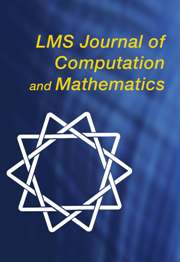Article contents
Fast heuristic algorithms for computing relations in the class group of a quadratic order, with applications to isogeny evaluation
Published online by Cambridge University Press: 26 August 2016
Abstract
In this paper, we present novel algorithms for finding small relations and ideal factorizations in the ideal class group of an order in an imaginary quadratic field, where both the norms of the prime ideals and the size of the coefficients involved are bounded. We show how our methods can be used to improve the computation of large-degree isogenies and endomorphism rings of elliptic curves defined over finite fields. For these problems, we obtain improved heuristic complexity results in almost all cases and significantly improved performance in practice. The speed-up is especially high in situations where the ideal class group can be computed in advance.
MSC classification
- Type
- Research Article
- Information
- LMS Journal of Computation and Mathematics , Volume 19 , Special Issue A: Algorithmic Number Theory Symposium XII , 2016 , pp. 371 - 390
- Copyright
- © The Author(s) 2016
References
- 5
- Cited by


